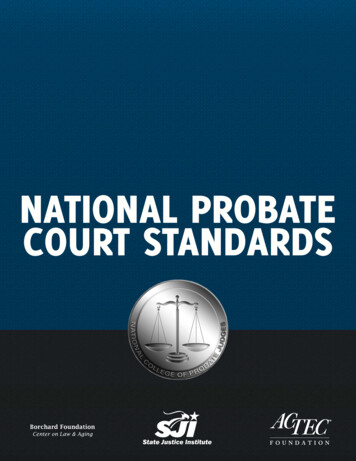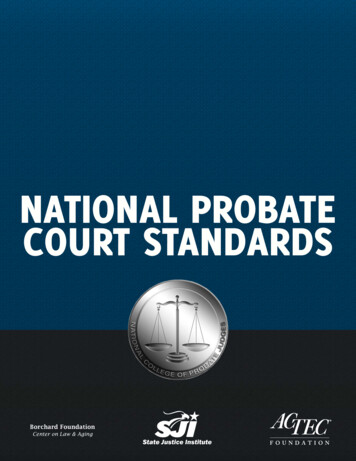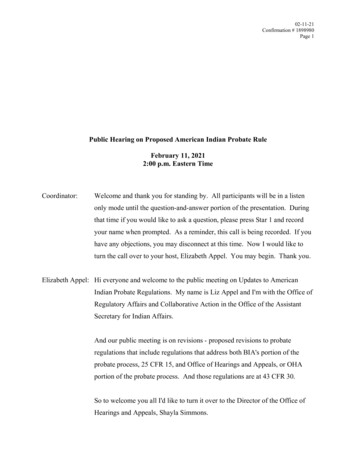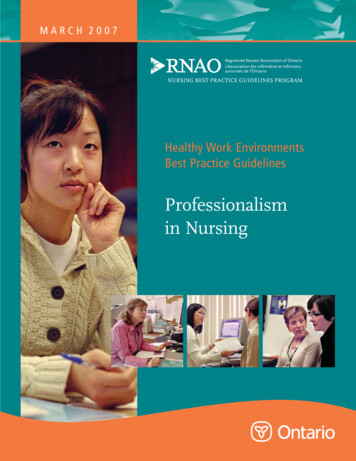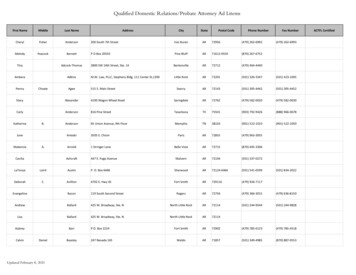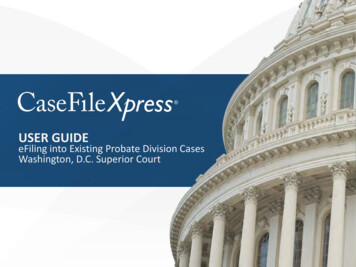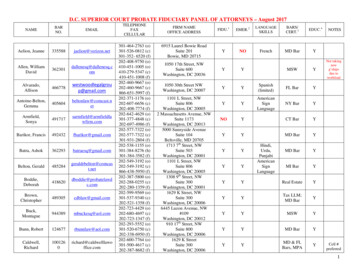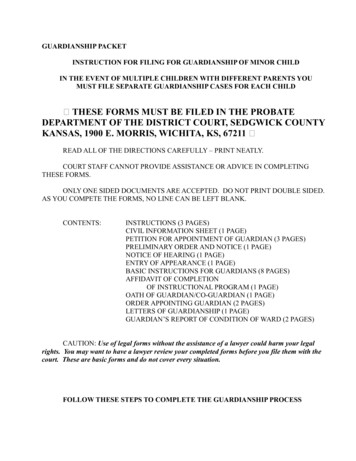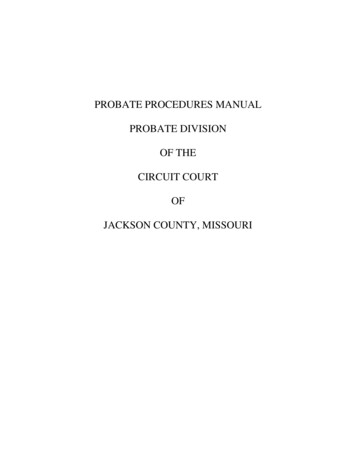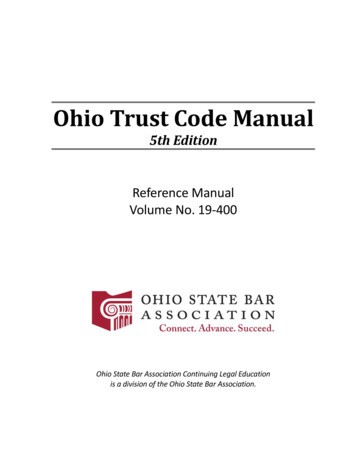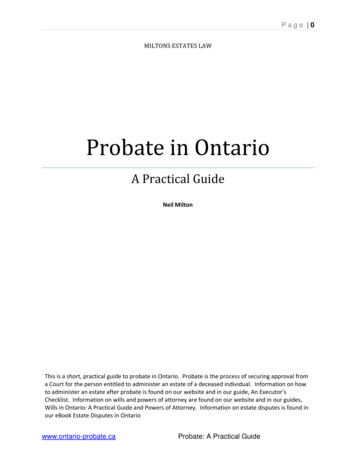
Transcription
Page 0MILTONS ESTATES LAWProbate in OntarioA Practical GuideNeil MiltonThis is a short, practical guide to probate in Ontario. Probate is the process of securing approval froma Court for the person entitled to administer an estate of a deceased individual. Information on howto administer an estate after probate is found on our website and in our guide, An Executor’sChecklist. Information on wills and powers of attorney are found on our website and in our guides,Wills in Ontario: A Practical Guide and Powers of Attorney. Information on estate disputes is found inour eBook Estate Disputes in Ontariowww.ontario-probate.caProbate: A Practical Guide
Page 1Table of ContentsAbout Us . 3About this book . 3Other eBooks in this series . 4Terminology . 4What is Probate? . 5When is probate required? . 5When probate is not required. . 6Named in a will: act or renounce?. 7Insolvent Estates . 8When the estate has debts . 8The cost of probate . 9The costs of estate administration . 9Getting advice . 10A lawyer to assist with probate . 10The lawyer acts for the estate trustee and not for the estate . 10Getting advice and assistance after probate. 11Who pays?. 13The value of the estate . 14The assets of the deceased . 14The liabilities of the deceased and the estate . 14Estate assets – common challenges . 14Joint ownership . 15Beneficiary designations . 15Life insurance . 15Pensions . 15TFSAs. 16RRSPs and RRIFs . 16Divorce and Separation . 17Passing accounts: be prepared from the start! . 18Probate fees in Ontario: Estate Administration Tax . 19www.ontario-probate.ca Probate in Ontario: A Practical Guide
Page 2Minimizing Probate Taxes . 20Don’t be penny-wise, pound-foolish . 20How to apply for Probate . 21Prepare the right forms . 21Serve the application on everyone entitled to service . 22File the application with the Court, in the right place. 22Calculate and Pay the Estate Tax. 22Bonding . 23When required . 23Court Orders to Dispense with Bonds . 24The Information Required to Dispense with a Bond. 25The Information Required for a Probate Application. 26A Sample Probate Application Form. . 27Further Information . 32About Us . 32www.ontario-probate.ca Probate in Ontario: A Practical Guide
Page 3About UsWe are Miltons Estates Law a team of Ontario lawyers dedicated toproviding excellent advice about estates law. We focus on providingadvice that is practical, cost-effective, and results-oriented.We do not draft wills.We assist executors with all facets of estates, contentious and noncontentious, from probate to passing of accounts. We assist beneficiariesto enforce their rights. And we frequently act as the estate trustee toadminister estates quickly and fairly.Contact us at 1-888-995-0075, orat www.ontario-probate.caAbout this bookThis eBook is exclusively about estate law in Ontario.Estate law is very parochial – it varies from state to state, province to province, andcountry to country. In effect there are over 60 different estate law jurisdictions in NorthAmerica alone and each is different, sometimes profoundly so.Ontario is a common law jurisdiction, and estate law in civil law jurisdictions such asmost countries in Europe and Latin America tends to be quite different.This eBook is intended to be short informal guide for non-lawyers about probate inOntario. It is not precise legal analysis, legal advice about your particular situation, or ahow-to-guide.www.ontario-probate.ca Probate in Ontario: A Practical Guide
Page 4Other eBooks in this seriesThis eBook is one of a series. The others are: Wills: A Practical GuidePowers of Attorney: A Practical GuideThe Executor’s Checklist.Estate Disputes in Ontario: A Practical GuideWhile there is some overlap in the material, these eBooks cover different material. Forthe most thorough understanding of the subject matter, we recommend that you consultall of them together.TerminologyA person who makes a will is a ‘testator’. A person who dies without a will dies‘intestate’.An executor is a person named by the testator in their will to administer the estate.Often, a Court order is necessary to actually administer an estate (see below for whenprobate is required). The person appointed by the Court to administer the estate of thedeceased is the ‘estate trustee’. Depending on whether there is a will or not the estatetrustee is the ‘estate trustee with a will’ or the ‘estate trustee without a will’.Probate is the process by which the Court appoints an estate trustee. Where there is awill, the person with the first right to apply for a Certificate of Appointment of EstateTrustee is the executor, and if the person applying is not the executor, the reason thatthe executor is not applying must be provided.www.ontario-probate.ca Probate in Ontario: A Practical Guide
Page 5What is Probate?Probate is the Court procedure for:-formal approval of a will by the Court as the valid last will of the deceased; and-formal confirmation by the Court of the appointment of the person who will act asthe executor of the estate.In effect, probate is what gives the executor the authority to act on behalf of thedeceased.During probate, the two key questions that the Court must address are:-Is this the last will of the deceased?-Is this will valid?-Is the proposed estate trustee the right person to administer this estate?When is probate required?Not all estates require probate. However, the number of estates that can be resolvedquickly and informally without probate or any formal proceedings is falling rapidly.Whether or not probate is required depends largely on: the nature of the assets in the estate, and whether the choice of executor, or actions of the executor, may be contested byone or more beneficiaries (inheritors) or other people.Generally, financial institutions and land registry offices will require probate to confirmthat the estate trustee is authorized to receive the assets and funds that belonged to thedeceased person.www.ontario-probate.ca Probate in Ontario: A Practical Guide
Page 6Probate will likely be required when the estate includes any of: real estate (houses, condos, apartments, cottages) owned by the deceased in hisor her name alone or as a tenant in common (ie. Owned any way but ‘in jointtenancy’); shares of a publicly-traded company (stocks listed on a stock market); or, funds or investments held at a financial institution (bank, trust company,brokerage) held solely in the name of the deceased and not ‘in joint tenancy’ withanother person (note that sometime these institutions will not require probate ifthe amounts are nominal).The estate should definitely be probated if: there is (or is likely to be) any dispute about the choice of estate trustee, orthe actions of the estate trustee are likely to give rise to any dispute, or,any beneficiary is unable to consent (because they are a minor child, or, an adultlacking capacity).There is no exemption from probate because it is ‘simple’ or ‘everyone agrees’ or‘the will is clear’.When probate is not required.There are only two types of estate that normally do not require probate:a. Where all of the assets pass directly to a beneficiary or joint owner. This is fairlycommon for modest estates of the ‘first spouse to die’ of long-married spouses.b. Where the estate is modest and consists solely of uncontested funds in a bankaccount, the bank agrees to waive the requirement for probate before releasingthe funds. Before waiving probate, most banks require the amount on deposit tobe less than 40,000, require there to be absolutely no dispute about the estateand who is entitled to the funds, and require all recipients of the funds to sign anIndemnity in which they agree to indemnify the bank from any liability forreleasing the funds. This waiver of probate by the bank is not a right - iswww.ontario-probate.ca Probate in Ontario: A Practical Guide
Page 7entirely at the discretion of the bank holding the funds and can be deniedat any time without reason. If the bank refuses to waive probate, then thesolution is to probate as quickly as possible.Named in a will: act or renounce?Just because you are named the executor in a willdoes not mean that you are obliged to accept.If for any reason you are unable or unwilling to take on the onerous duties of being theestate trustee you may renounce the role without explanation or cost, provided you do sobefore taking any steps to administer the estate.Renunciation is completed by signing a simple form.If you start administering the estate you cannot simply change your mind and renounce.Once you begin or interfere with the estate you must ‘resign’, and in order to do so youmust pass your accounts (see below).In general terms, you are permitted to make reasonable inquiries to see if you want to takeon the role without ‘meddling’ in the estate. If you take any action which changes theestate (deal with any assets or liabilities) for instance, then you have ‘meddled’ and canonly be released from liability by resigning and passing your accounts.www.ontario-probate.ca Probate in Ontario: A Practical Guide
Page 8Insolvent EstatesOne of the most common reasons for a named executor to refuse to probate is when theestate has debts greater than its assets.This is known as an insolvent or bankrupt estate. Insolvent estates should be handled, ifat all, by a registered insolvency practitioner (a ‘bankruptcy trustee’).When the estate has debtsThe estate trustee is not automatically liable for the debts of the deceased. Justbecause the deceased had debts does not automatically create a problem or liability forthe executor or estate trustee.The estate trustee is personally liable for: Debts that the estate trustee incurs (such as funeral and legal fees). The estatetrustee is not liable for costs incurred by other people. Ensuring that the assets of the estate are properly distributed, and this meansthat all creditors are paid 100% in full before any distribution is made to anybeneficiary.A potential estate trustee who believes that the estate is insolvent should investigate,but should not meddle in the estate before deciding whether to act or renounce (seeabove).There is no harm in probating an estate with debts or liabilities, where the assetsexceed the debts. Debts such as income taxes are very common, and are commonlypaid off from estate assets before any distribution to the beneficiaries.www.ontario-probate.ca Probate in Ontario: A Practical Guide
Page 9If the debts of the estate are complex or contentious (for instance, with litigationunderway), it is very helpful if the estate trustee has experience dealing with commercialdisputes and civil litigation. Accordingly, if the estate has complex or uncertain debts, itis common for relatives to renounce in favour of a professional who then applies to beappointed the estate trustee.The cost of probateLegal fees for applications for ‘probate’ are usually borne by the estate.The cost to probate is comprised of: Legal fees, if any;Disbursements, if any; and,Estate Administration Tax. (see below).Generally, the legal fees to probate an estate are in the range of 1,000 - 4,000.Except in highly unusual cases there is no reason for probate fees to be more.In our firm, the legal fees for the vast majority of probate applications are in the range of 2,000 - 3,000. Our fees are detailed on our website, and we will gladly provide afixed price quote in advance.The costs of estate administrationOnce an estate has been probated there are a number of possible expenses and costs.These vary from estate to estate but often include: Legal advice received by the estate trustee, including related to passing ofaccountsAccounting and tax filing servicesInvestment adviceHome cleaning and staging servicesReal estate brokerage servicesServices related to valuing and selling personal propertyThe services of the estate trusteeIn all cases, the costs incurred and fees charged must be reasonable. The costs ofsome of these services will be borne by the estate; the costs of services which arewww.ontario-probate.ca Probate in Ontario: A Practical Guide
P a g e 10‘normally’ provided by estate trustees will usually reduce the compensation otherwiseavailable for the estate trustee.Getting adviceA lawyer to assist with probateYou do not always need a lawyer to probate an estate – it is certainly possible to ‘do ityourself’. However, dealing with the courts and the required paperwork can be acomplex and confusing process, and most people do seek legal assistance withprobate. In particular, if there is no will, and it is necessary to deal with multipleconsents and renunciations, or apply to the court for an Order to dispense with a bond(see below), or the actions of the estate trustee are likely to be challenged or closelyscrutinized (for instance by a sibling who is a beneficiary but not a co-executor), then westrongly recommend that you seek professional assistance with probate and all otheraspects of the administration of the estate. Also, if delay is likely to cost money (forinstance if the estate has substantial value) then hiring a lawyer to move it along fasteris usually very cost-effective. Remember, each month of delay costs the beneficiariesincome – so trying but slowing down probate is rarely a good idea.The lawyer acts for the estate trustee and not for the estateAn estate is not a person. An estate is a trust, and the trustee is the estate trustee.Accordingly, the estate does not hire a lawyer, and there is no such thing as a lawyer‘for the estate’ with some magical duty to the estate or the beneficiaries.When an estate trustee hires a lawyer, that lawyer advises the trustee who hiredthem. This lawyer will be acting for, and owe duties to, the estate trustee who hiredthem and not to the estate, any other estate trustees (unless the all agreed to retainthe same counsel), the beneficiaries, or any other person.If co-executors have a disagreement, they should hire separate legal counsel.If a beneficiary disagrees with the conduct of the executor(s), that beneficiary shouldhire their own legal counsel. A beneficiary should never expect the lawyer for theestate trustee to look out for the beneficiary’s interests. In fact, many lawyers actingfor an estate trustee will refuse to speak to any beneficiary directly.www.ontario-probate.ca Probate in Ontario: A Practical Guide
P a g e 11There is no obligation to retain any particular lawyer to assist with probate. There isabsolutely no obligation to use the lawyer who drafted the will.When you engage a lawyer, you should be comfortable with the lawyer and theirengagement terms, including price, expertise, manner and service. As long as you payall outstanding accounts, you can switch lawyers at any time. You can get a secondopinion.Some lawyers charge a fee that is a percentage of the estate for all aspects of advisingthe estate trustee, from probate through distribution. Depending on the value of theestate and the actual work required, this may result in an extremely high fee. This isgenerally an old-fashioned way of charging. You are not obliged to accept these terms.The accounts of lawyers are subject to supervision by the Courts under a processknown as ‘assessment’. Invoices must be fair having regard to all of the relevantcircumstances which include time, effort, skill, quality of work and outcome, theimportant of the matter in issue, and the risk (if any) taken by the lawyer. If you areunhappy with the fees charged by a lawyer, you should use this process to ensure thatthe fees charged were fair.Getting advice and assistance after probateIn all cases, the trustee must meet their obligations to the beneficiaries. They cannotavoid these liabilities by delegating to third parties. Equally, however, while it ispossible for trustees to handle the entire estate alone, often it is best practice to hire aprofessional with specialized expertise as this produces both better results and a papertrail to support the results achieved. For instance, the benefits of hiring a real estateprofessional should include proper pricing and marketing of the property to ensure thatthe estate receives fair value for a property as quickly as possible.In addition to hiring professional advisors, estate trustees can hire third parties to assistwith routine tasks of administering the estate, and often this is by far the best course ofaction. For instance, it is often the duty of an estate trustee to sell a house owned bythe deceased within a reasonable time. It is not the duty of the estate trustee topersonally clean and prepare the house for sale without hiring anyone or incurring anycosts. Often it is in the beneficiaries’ best interest for the estate trustee to incurwww.ontario-probate.ca Probate in Ontario: A Practical Guide
P a g e 12reasonable fees to hire junk removal, auction, cleaning, and staging services to get thenecessary work done quickly and effectively.Accountants: Doing your own taxes is simple compared to being an executor. If youdon’t do your own taxes without an accountant, then you definitely should not be tryingto do the taxes of the deceased without advice.Lawyers: Lawyers advise their clients on rights and duties, and, they can assist toenforce rights (by prosecuting legal proceedings) and assist trustees to perform duties(by doing such things as drafting probate applications).An estate trustee can entrust a lawyer to handle almost the entire administration of theestate. However, the estate trustee remains responsible for the outcome, and theestate trustee should not be compensated for work performed by legal counsel (andlegal counsel should be compensated at trustee rates not lawyers’ rates for performingtrustee work).Other experts: Executors often hire other experts to assist with particular matters,including: investment advisors to assist with investments;accountants to assist with accounting and tax returns;real estate agents to assist with selling real estate;appraisers and auctioneers to assist with selling other assets.www.ontario-probate.ca Probate in Ontario: A Practical Guide
P a g e 13Who pays?Professional advice to perform the roleAs a general rule reasonable professional fees incurred by the estate trustee securingprofessional advice that assists her to carry out her duties will be borne by the estate,and not by the executor herself. Examples include real estate agents, investmentadvisors, and lawyers assisting to interpret the will and with probate applications.Assistance to fulfill trustee dutiesFees incurred by the estate trustee to hire others to help fulfill duties of the estatetrustee should generally be paid for by the estate trustee, by way of a correspondingreduction in compensation to the trustee. Examples include fees for paying bills andcleaning a home. If estate expenses are paid by a law firm that is holding estate fundsin trust, the fees for these services should reduce trustee compensation.Assistance defending the trusteeLegal fees incurred by the estate trustee to protect their inheritance as beneficiary areusually not a legitimate estate expense.Fees incurred by an estate trustee defending their role or performance as estate trusteemay be a legitimate estate expense, especially if the trustee is vindicated or if theproblem was caused by the testator.The estate trustee is responsible for ensuring that the fees charged by their legalcounsel (and all other professional advisors) are fair and reasonable, and should takesteps to object to any unreasonable fee charged by any professional.www.ontario-probate.ca Probate in Ontario: A Practical Guide
P a g e 14The value of the estateThe estate of a deceased person is composed of theassets and liabilities of the deceased, valued as at the dateof death.The assets of the deceasedAll property including real property and personal property(tangible and intangible) owned by the deceased on theirdeath falls into their estate and must be dealt with by theirestate trustee. The value for probate purposes is the valueon the date of death. This raises the key issue: whatassets are in the estate? Some of the most contentiousissues are digital subscriptions, jointly owned assets, andfinancial assets with designated beneficiaries. These arediscussed briefly below.The liabilities of the deceased and theestateThe estate trustee must identify and pay all liabilities of thedeceased, and all debts incurred by the estate. It can be achallenge to identify liabilities of the deceased. Estatetrustees are protected from personal liability fromundisclosed liabilities if they advertise prior to distributingthe estate. Traditionally these advertisements were placedin local newspapers, but now some online notices areacceptable.Estate assets – common challengesCurrently, pets are considered tangible personal propertyand thus can be estate ‘assets’.Jointly-ownedAssets – Becareful!Houses and bankaccounts jointly held bythe deceased and one ormore of their adultchildren are a frequentcause of expensive estatedisputes. See our eBookon Disputes for more.Beneficiary designationsfor RRIFs, RRSPs,TFSAs, and life insurancecan also cause serioustax problems, and unfairdistribution of the estate.However, they are oftensigned quickly at a bankwithout much thought.Make sure youunderstand the impactof these very importantdesignations.Intellectual property rights, such as ownership of copyrightto songs, literary works, images and videos are intangiblepersonal property and can form part of an estate.Conversely, however, users of many digital ‘services’ such as Facebook, Instragramand LinkedIn often have no ownership rights to their accounts and access to theseaccounts by estate trustees may be limited or prohibited by the owners of the services.www.ontario-probate.ca Probate in Ontario: A Practical Guide
P a g e 15Joint ownershipMany assets are owned by more than one person. Some, but not all, forms of jointownership result in the deceased losing all ownership of the asset on their death. Whenthis occurs, the assets does not form part of the estate of the deceased, and is notgoverned by their will. For instance, when real estate is owned ‘in joint tenancy with aright of survivorship’, then upon the first death of a co-owner, the deceased ceases tohave any ownership of the property and the surviving co-owner is now the sole owner.Note that there is no ‘transfer’ of the asset to the survivor, the deceased simply drops offtitle to the property.Beneficiary designationsSome financial ‘assets’ can pass directly to a designated or named beneficiary and as aresult do not fall into the estate of the deceased. Except where a will is clearly draftedto over-rule a previous designation, these designations often prevail regardless ofwhether the deceased had a will or not.Life insuranceLife insurance, which often has limited or no value to the deceased before or afterdeath, results in a contractually agreed payment by the insurer to the beneficiaries ofthe policy. If the life insurance passes directly to a named beneficiary it is not part ofthe estate and is not governed by the will.If there is no surviving designated beneficiary, then the policy will be paid to the estateof the deceased.The proceeds of a life insurance policy are not taxable income for the recipient (whethera beneficiary or the estate).PensionsPensioners have some, but limited, rights to designate beneficiaries of their pension.Generally, the beneficiary of any pension rights that survive the death of the pensionermust pass to the person who was the spouse of the deceased at the time of death(whether common law or by marriage).If, but only if, the deceased did not have a spouse at their death can the pensionbenefits pass to a named beneficiary.www.ontario-probate.ca Probate in Ontario: A Practical Guide
P a g e 16TFSAsThere is no tax related to a TFSA on death.There are two different types of designations for TFSAs:a) A successor annuitant. If the spouse of the TFSA holder is named as asuccessor annuitant, then the entire TFSA rolls over to the spouse. The TFSAremains a TFSA and thus can continue to grow tax free for the life of thesurviving spouse.b) A named beneficiary, who receives the proceeds of the TFSA tax free but thefunds in it cease to be inside a TFSA and cease to grow tax free (although if therecipient has “TFSA contribution room” they may contribute the funds to theirown TFSA).In both cases of beneficiary designations, the TFSA passes outside the estate and doesnot form part of the estate of the deceased.If there is no designated beneficiary, or no beneficiary survives the testator, then theTFSA falls into the estate.RRSPs and RRIFsRRSPs and RRIFs can pass by designation directly outside the estate. When there is avalid designation, not over-ruled by a will, the full value of the plan will pass to thenamed beneficiary outside the estate without involvement of the estate trustee andwithout any Estate Administration Tax being payable.If the RRSP/RRIF is ‘rolled over’ to a surviving spouse, it retains its character as taxdeferred savings, and does not create taxable income on the death of the holder(taxable income is generated as funds are withdrawn from the plan).If the designated beneficiary of the RRSP/RRIF is anyone other than the spouse of thedeceased, then the full value of the Plan must be included in taxable income of thedeceased in the year of death. The tax payable can be very significant. This tax ispayable by the estate, not by the beneficiary.Where there is no designation, or the named beneficiary pre-deceases the plan holder,the value does fall into the estate of the deceased.www.ontario-probate.ca Probate in Ontario: A Practical Guide
P a g e 17Divorce and SeparationIf married spouses divorce, a will made before the divorce remains valid but is read as ifthe ex-spouse pre-deceased.Divorce does not automatically revoke beneficiary designations on life insurance,TFSAs, RRSPs or RRIFs. These designations should be dealt with in any
P a g e 5 www.ontario-probate.ca Probate in Ontario: A Practical Guide What is Probate? Probate is the Court procedure for: - formal approval of a will by the Court as the valid last will of the deceased; and
